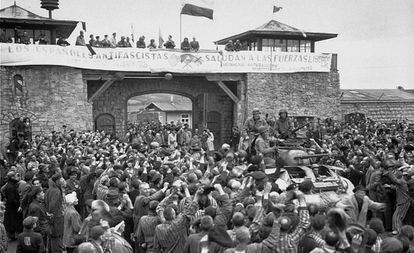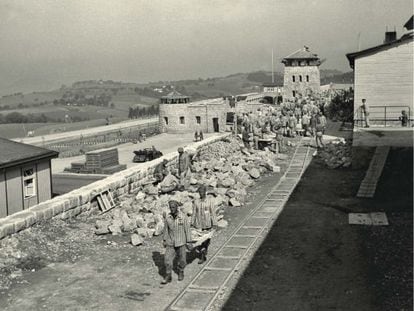Remembering the 4,427 Spaniards who died at the Mauthausen concentration camp
The Official State Bulletin has published data on the Republicans who lost their lives in the Nazi prison, as a way of “giving them back their dignity”

For years, the names of the 4,427 Spaniards who died in the Nazi concentration camp, Mauthausen-Gusen, were tucked away inside several old books in the headquarters of the Central Civil Registry on Madrid’s Montera street. But on Friday, the Spanish government released the data on all the Spanish Mauthausen victims in the Official State Bulletin (BOE), meaning names, places of birth and dates of death can be linked to the thousands of personal stories of the Republicans who fought in two wars and ended up in a concentration camp.
This is a way of giving them back their dignity
Amalia Basante, magistrate of the Civil Registry
Aside from public recognition, the release of the data will allow family members to crosscheck the available information on the victims for themselves.
The list published by the BOE has been coordinated by a group of historians, led by professor Gutmaro Gómez Bravo from the Complutense University in Madrid who warns, “There are surnames or places of birth which could be wrong as many prisoners of war were scared of reprisals against their loved ones or their political colleagues.”
Meanwhile, Jorge del Hoyo, the academic coordinator of the inter-ministerial commission for the 80th anniversary of the Republican exile endured by 99.9% of the Mauthausen victims, says, “It is a valuable historical document but it has possible errors which is why an allegation process is being opened.”
Six hundred and ninety-five names have been added to the 4,427 found in the books after historians, funded by associations such as the Amical de Mauthausen (Friends of Mauthausen), embarked on an investigation in a bid to put names to all the Spanish victims of the Nazi genocide, including those who ended up in other camps.
According to Gómez Bravo, recording these names is essential from the historical memory point of view given that these archives were deliberately hidden by the Franco regime. Gathered in 10 volumes, they should have been put at the disposal of the victims’ families, which would have allowed them to claim compensation from both Germany and France.
“The death of these people was never recorded in a civil registrar,” says Amalia Basante, magistrate of the Civil Registry. “This is a way of giving them back their dignity.”
It has been 74 years since the Republican prisoners welcomed US troops with an enormous banner that read: “The anti-fascist Spaniards salute the liberating forces.” Nearly 10,000 Spaniards were sent to concentration camps located in the vicinity of Mauthausen in Austria, where they were used as slave labor in the granite quarries. Around half of these prisoners lived to tell the tale, but the names of those who did not survive the terrible conditions have remained under wraps until now.
“In 1951, Spanish authorities received a series of records from France, with the identity, dates of birth and dates of death of the deceased citizens in the camps, above all in Mauthausen-Gusen,” says Basanta.
Nearly 10,000 Spaniards were sent to Nazi concentration camps
According to Del Hoyo, the information in the books was derived from the identity cards made by the Spanish prisoners under German orders. When the liberation of the camp drew near, the prisoners managed to prevent the Nazi officials from destroying the evidence of their crimes and part of the archive remained. One of the key figures behind this feat was Joan de Diego Herranz from Barcelona, who managed to survive the war, dying at home in Barcelona in 2003, aged 87. Only six prisoners remain alive today.
Most of the victims were Republicans who had crossed the border into France in the last months of the Spanish Civil War and who became part of French Resistance. There were also women and children from the refugee camps in the south of France. When France fell under Nazi rule with Philippe Pétain as chief of state of Vichy France, these Republicans were taken to Austria on the suggestion of the Franco regime; Franco’s governing minister and brother in law, Ramón Serrano-Suñer, struck an agreement with the Nazis that all their Spanish prisoners of war should be taken to labor camps.
Basanta explains that the publication of the names aims to provide redress for victims by rescuing them from obscurity. “It is a way of recognizing them as Spaniards because we have the capacity to register the deaths of Spaniards abroad,” she explains.
The government has set May 5 as the day to honor the Spanish victims of Nazi concentration camps while the Ministry of Justice is also paving the way for a monument to be erected in Madrid in their memory. And through the legal acknowledgment of their death, the victims can finally, if only figuratively, return home.
English version by Heather Galloway.












































